Navigation
Venezuela Ends Shark Finning, Creates Protected Area
Venezuela set forth a series of measures this week to protect sharks within its waters. Most significantly, commercial shark fishing is now prohibited throughout the 3,730 square kilometers (1,440 square miles) of the Caribbean Sea that make up the popular Los Roques and Las Aves archipelagos, whose pristine beaches and coral reefs make it a diving and fishing attraction.
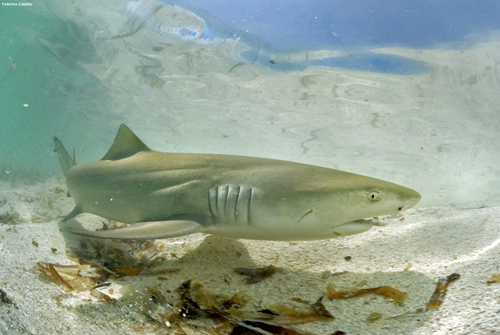 Lemon sharks are now protected by the shark fishing ban implemented in the Los Roques Archipelago off of Venezuela.: Photograph by Federico Cabello
Lemon sharks are now protected by the shark fishing ban implemented in the Los Roques Archipelago off of Venezuela.: Photograph by Federico Cabello
Venezuela set forth a series of measures this week to protect sharks within its waters. Most significantly, commercial shark fishing is now prohibited throughout the 3,730 square kilometers (1,440 square miles) of the Caribbean Sea that make up the popular Los Roques and Las Aves archipelagos, whose pristine beaches and coral reefs make it a diving and fishing attraction.
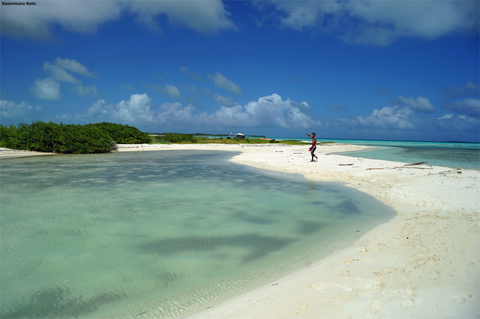 A marine paradise in the Caribbean Sea, Los Roques offers a wealth of natural resources.: Photograph by Maximiliano Bello
A marine paradise in the Caribbean Sea, Los Roques offers a wealth of natural resources.: Photograph by Maximiliano Bello
Scientists have identified Los Roques, located about 128 kilometers (80 miles) off the Venezuelan coast, as an important breeding ground and nursery for populations of several species of sharks, including the lemon shark and the Caribbean reef shark.
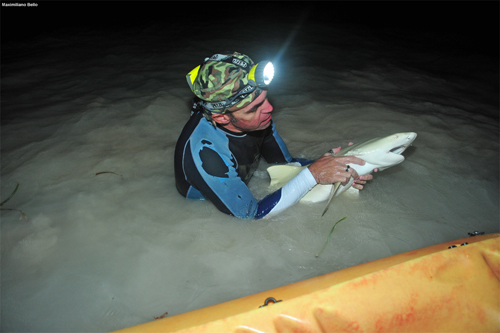 Rafael Tavares on a research trip, preparing to tag a juvenile lemon shark in the lagoons of Los Roques.: Photograph by Maximiliano Bello
Rafael Tavares on a research trip, preparing to tag a juvenile lemon shark in the lagoons of Los Roques.: Photograph by Maximiliano Bello
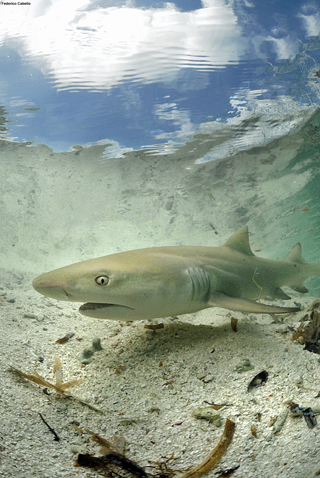 Shark scientist, Rafael Tavares, has been studying the lemon shark and other species in this area for more than 10 years.: Photograph by Federico Cabello“Our research has found that newborn sharks in the mangroves and cays of Los Roques migrate throughout the Caribbean and Atlantic Ocean,” said Rafael Tavares, an expert with Instituto Nacional de Investigaciones Agrícolas (INIA), Venezuela, who has researched sharks in the region for nearly 20 years. “These new, far-reaching protections would not be possible without the support of the Los Roques community, especially the local fishermen.”
Shark scientist, Rafael Tavares, has been studying the lemon shark and other species in this area for more than 10 years.: Photograph by Federico Cabello“Our research has found that newborn sharks in the mangroves and cays of Los Roques migrate throughout the Caribbean and Atlantic Ocean,” said Rafael Tavares, an expert with Instituto Nacional de Investigaciones Agrícolas (INIA), Venezuela, who has researched sharks in the region for nearly 20 years. “These new, far-reaching protections would not be possible without the support of the Los Roques community, especially the local fishermen.”
The new regulation also prohibits the practice of shark finning (cutting off the fins and dumping the body overboard at sea) and mandates that all of these animals caught in Venezuelan waters must be brought to port with their fins naturally attached.
“Venezuela’s decision to prohibit shark finning means that it now joins the rest of the countries of South America, North America, and Central America in banning this wasteful practice,” said Jill Hepp, manager of global shark conservation at the Pew Environment Group.
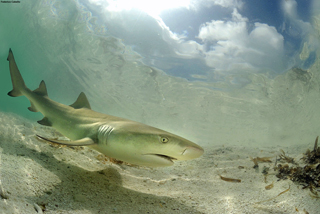 Tavares’ research has shown that Los Roques is one of the most important shark breeding areas of the Caribbean Sea;: protecting this area secures healthier shark populations throughout the region. Photograph by Federico Cabello
Tavares’ research has shown that Los Roques is one of the most important shark breeding areas of the Caribbean Sea;: protecting this area secures healthier shark populations throughout the region. Photograph by Federico Cabello
“Combined with the breeding ground safe haven in Los Roques and Las Aves, this is the latest step in the growing global movement to save these magnificent animals.”
Sharks are highly susceptible to overfishing because of biological characteristics such as long life, low birthrate, and few offspring. It is estimated that up to 73 million are killed annually for their fins, primarily due to increased demand for shark fin soup.
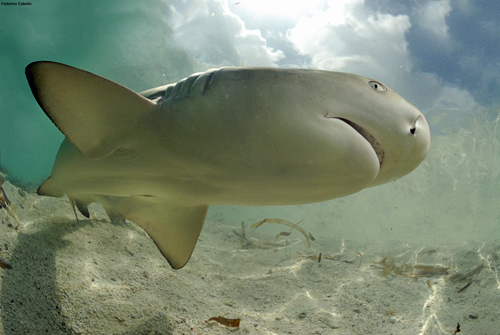 Local fishermen have committed to protecting sharks in order to maintain the health of the ocean environment.: Photograph by Federico Cabello
Local fishermen have committed to protecting sharks in order to maintain the health of the ocean environment.: Photograph by Federico Cabello
This news is from the Pew Environment Group, 20 June 2012.
Note:
The Pew Environment Group is the conservation arm of The Pew Charitable Trusts, a nongovernmental organization that works globally to establish pragmatic, science-based policies that protect our oceans, preserve our wildlands, and promote clean energy. For more information, visit www.PewEnvironment.org<http://www.PewEnvironment.org>.
Search
Latest articles
Agriculture
- World Water Week: Healthy ecosystems essential to human health: from coronavirus to malnutrition Online session Wednesday 24 August 17:00-18:20
- World Water Week: Healthy ecosystems essential to human health: from coronavirus to malnutrition Online session Wednesday 24 August 17:00-18:20
Air Pollution
- "Water and Sanitation-Related Diseases and the Changing Environment: Challenges, Interventions, and Preventive Measures" Volume 2 Is Now Available
- Global Innovation Exchange Co-Created by Horizon International, USAID, Bill and Melinda Gates Foundation and Others
Biodiversity
- It is time for international mobilization against climate change
- World Water Week: Healthy ecosystems essential to human health: from coronavirus to malnutrition Online session Wednesday 24 August 17:00-18:20
Desertification
- World Water Week: Healthy ecosystems essential to human health: from coronavirus to malnutrition Online session Wednesday 24 August 17:00-18:20
- UN Food Systems Summit Receives Over 1,200 Ideas to Help Meet Sustainable Development Goals
Endangered Species
- Mangrove Action Project Collaborates to Restore and Preserve Mangrove Ecosystems
- Coral Research in Palau offers a “Glimmer of Hope”
Energy
- Global Innovation Exchange Co-Created by Horizon International, USAID, Bill and Melinda Gates Foundation and Others
- Wildlife Preservation in Southeast Nova Scotia
Exhibits
- Global Innovation Exchange Co-Created by Horizon International, USAID, Bill and Melinda Gates Foundation and Others
- Coral Reefs
Forests
- NASA Satellites Reveal Major Shifts in Global Freshwater Updated June 2020
- Global Innovation Exchange Co-Created by Horizon International, USAID, Bill and Melinda Gates Foundation and Others
Global Climate Change
- It is time for international mobilization against climate change
- It is time for international mobilization against climate change
Global Health
- World Water Week: Healthy ecosystems essential to human health: from coronavirus to malnutrition Online session Wednesday 24 August 17:00-18:20
- More than 400 schoolgirls, family and teachers rescued from Afghanistan by small coalition
Industry
- "Water and Sanitation-Related Diseases and the Changing Environment: Challenges, Interventions, and Preventive Measures" Volume 2 Is Now Available
- Global Innovation Exchange Co-Created by Horizon International, USAID, Bill and Melinda Gates Foundation and Others
Natural Disaster Relief
- STOP ATTACKS ON HEALTH CARE IN UKRAINE
- Global Innovation Exchange Co-Created by Horizon International, USAID, Bill and Melinda Gates Foundation and Others
News and Special Reports
- World Water Week: Healthy ecosystems essential to human health: from coronavirus to malnutrition Online session Wednesday 24 August 17:00-18:20
- STOP ATTACKS ON HEALTH CARE IN UKRAINE
Oceans, Coral Reefs
- World Water Week: Healthy ecosystems essential to human health: from coronavirus to malnutrition Online session Wednesday 24 August 17:00-18:20
- Mangrove Action Project Collaborates to Restore and Preserve Mangrove Ecosystems
Pollution
- Zakaria Ouedraogo of Burkina Faso Produces Film “Nzoue Fiyen: Water Not Drinkable”
- "Water and Sanitation-Related Diseases and the Changing Environment: Challenges, Interventions, and Preventive Measures" Volume 2 Is Now Available
Population
- "Water and Sanitation-Related Diseases and the Changing Environment: Challenges, Interventions, and Preventive Measures" Volume 2 Is Now Available
- "Water and Sanitation-Related Diseases and the Changing Environment: Challenges, Interventions, and Preventive Measures" Volume 2 Is Now Available
Public Health
- Honouring the visionary behind India’s sanitation revolution
- Honouring the visionary behind India’s sanitation revolution
Rivers
- World Water Week: Healthy ecosystems essential to human health: from coronavirus to malnutrition Online session Wednesday 24 August 17:00-18:20
- Mangrove Action Project Collaborates to Restore and Preserve Mangrove Ecosystems
Sanitation
- Honouring the visionary behind India’s sanitation revolution
- Honouring the visionary behind India’s sanitation revolution
Toxic Chemicals
- "Water and Sanitation-Related Diseases and the Changing Environment: Challenges, Interventions, and Preventive Measures" Volume 2 Is Now Available
- Actions to Prevent Polluted Drinking Water in the United States
Transportation
- "Water and Sanitation-Related Diseases and the Changing Environment: Challenges, Interventions, and Preventive Measures" Volume 2 Is Now Available
- Urbanization Provides Opportunities for Transition to a Green Economy, Says New Report
Waste Management
- Honouring the visionary behind India’s sanitation revolution
- Honouring the visionary behind India’s sanitation revolution
Water
- Honouring the visionary behind India’s sanitation revolution
- Honouring the visionary behind India’s sanitation revolution
Water and Sanitation
- Honouring the visionary behind India’s sanitation revolution
- Honouring the visionary behind India’s sanitation revolution

